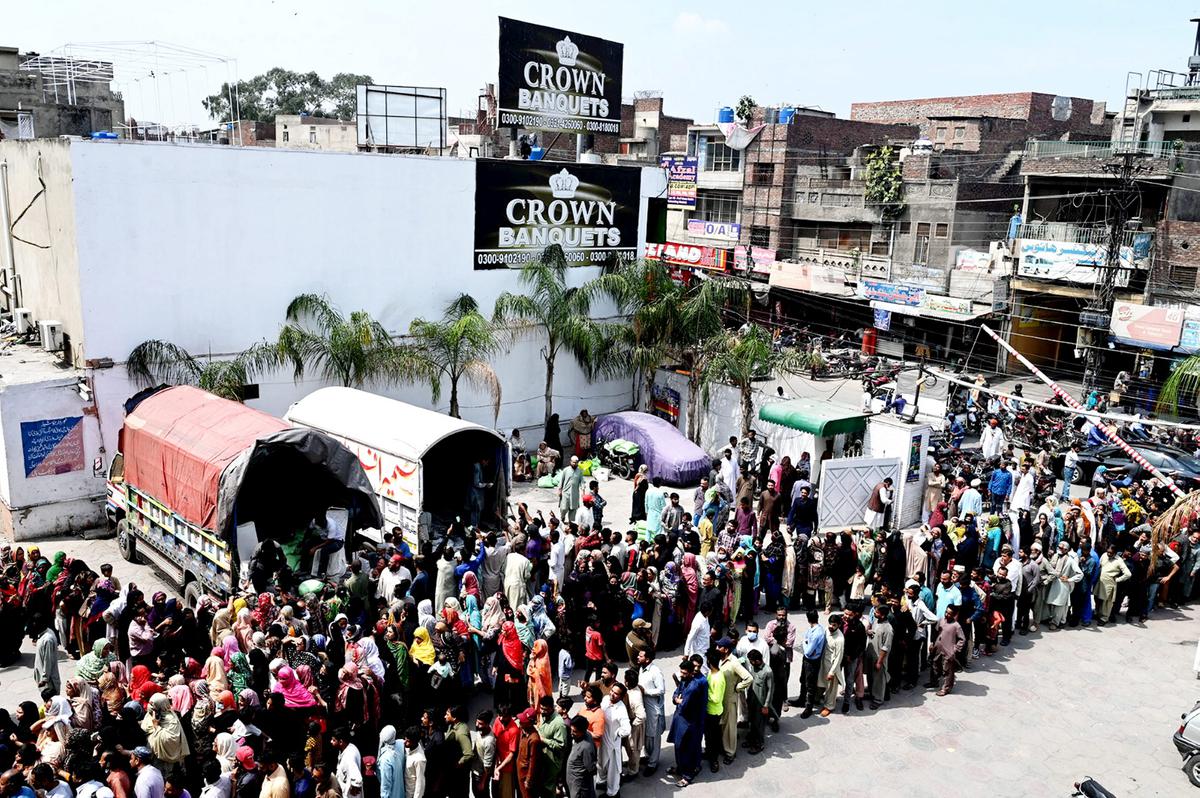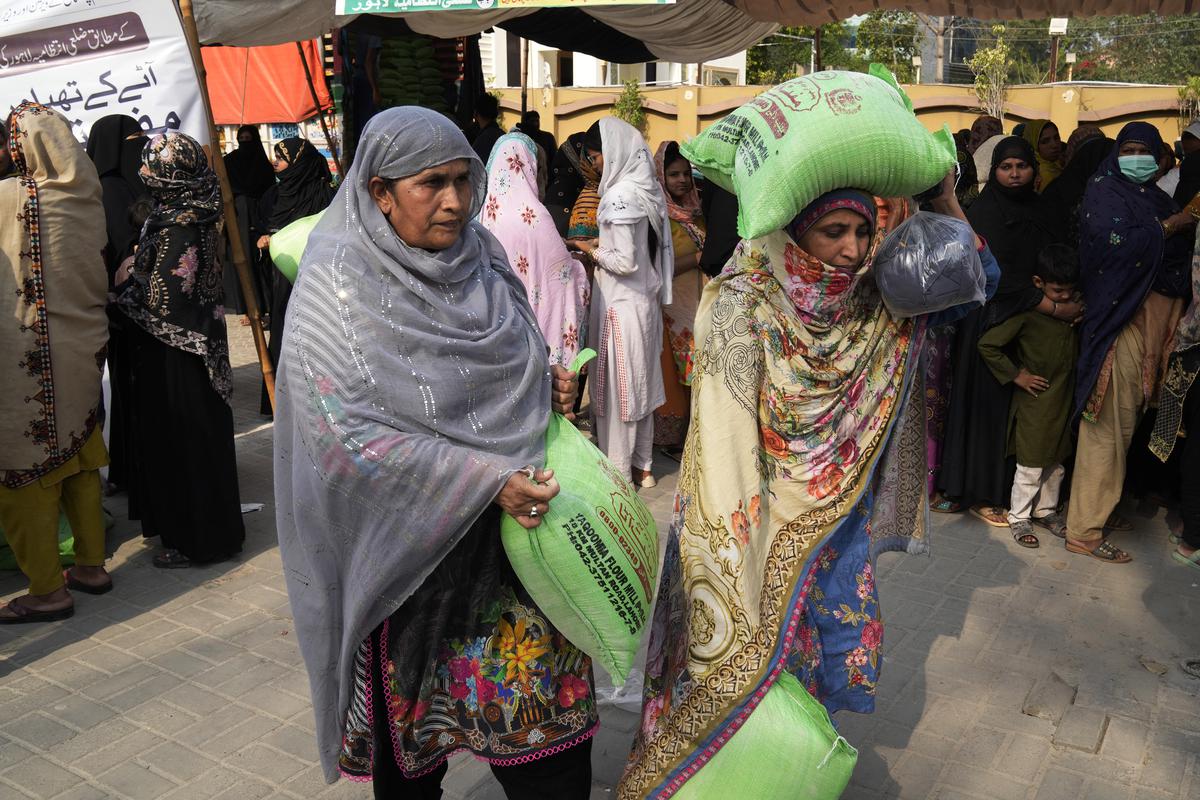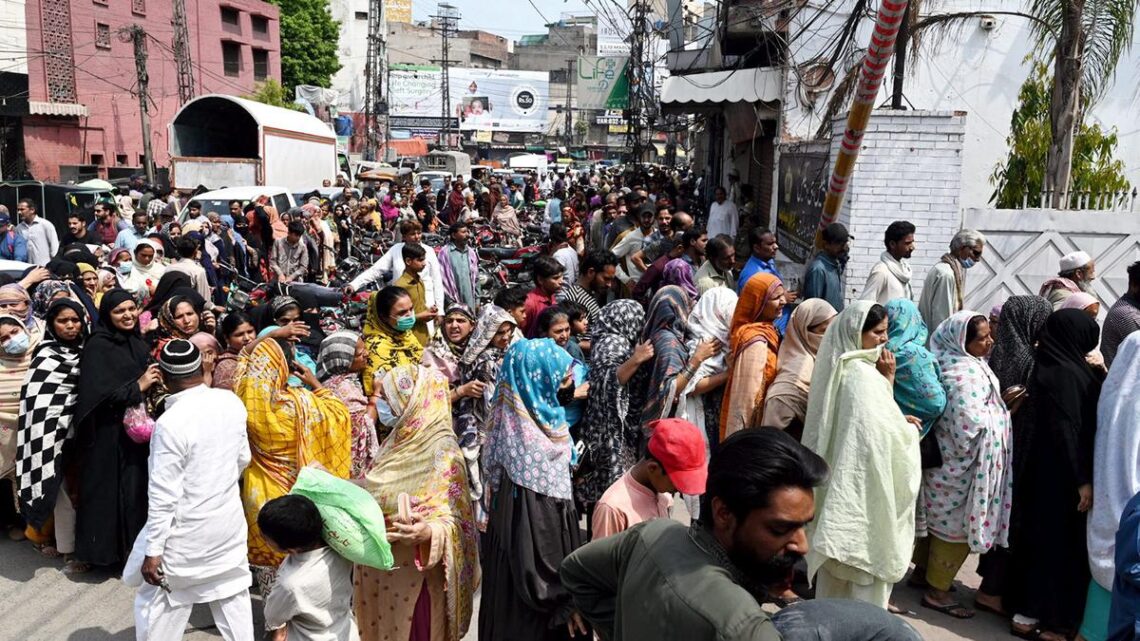[ad_1]
Nazim Malik pulled out his children from a private English-medium school and enrolled them in a government-run Urdu school because he can no longer afford their fees amid the spiralling inflation that has made life miserable for most Pakistanis who are now worried about two meals a day for their families.
The Pakistani rupee in recent months has seen a dramatic erosion in its value to the U.S. dollar, currently trading at around PKR 288 in the open market.
In the month of Ramzan, buying fruits to break the fast has become a luxury for millions across the country.
The economic situation has never been so grim in a country which since independence has thrice seen military coups and the ouster of elected governments.
Cash-strapped Pakistan’s economy has been in a free fall mode for the last many years, bringing untold pressure on the poor masses in the form of unchecked inflation, making it almost impossible for a vast number of people to make ends meet. Their woes increased manyfold after last year’s catastrophic floods that killed more than 1,700 people and caused massive economic losses.

People gathered for free flour and other ration in Lahore.
| Photo Credit:
PTI
“Mehngai (inflation) has crushed my buying power. Literally, the two-time meal is not possible with what I earn,” Malik, who works as an accountant in Lahore, said.
During the last six months, inflation climbed to a level where his salary – 65,000 Pakistani rupees (PKR) – seems to be only meant to buy food for his wife and three children.
“I pulled out my children from an English-medium school to get them enrolled in a government-run Urdu public school because I can no longer afford their fees. I am lucky that I don’t have to give house rent as I am living in my parents’ house. I am desperately looking for some extra work to supplement my income,” he said.
Mr. Malik cursed the incumbent rulers for paying no attention to the plight of the people and being busy with politicking.
Over two-dozen people, mostly women, have died during the last two weeks in the country in their bid to get free food or wheat.
Shakil Ahmad, who works in a canteen on a monthly salary of 25,000 rupees, says although he is single the amount he earns is spent in the first two weeks of the month and he either lives on borrowed money or does overtime to survive for the remaining period.
The prices of fruits and vegetables have gone beyond the reach of most people and the poor are only concerned with flour and rice, he said.
In Lahore, one kg of flour is priced at PKR 170, which Mohammad Hanif, a labourer, said he could not afford if he does not get work all days of the week.
“So, the day I don’t get work, I prefer to stand in long queues to get free flour under the government scheme,” Mr. Hanif said.
School teacher Abbas Rana, 59, says he has never witnessed such biting inflation in his life. “Price of every commodity shot up to a level where only the affluent can think of buying them. Fruits and meat are prohibited for us. My struggle is to ensure two meals a day for my family,” Mr. Rana said.
The people complain that they no longer have any money left for medicines, new clothing or travelling.
“The prices of commodities have quadrupled during the last year, whereas the income has shrunk,” Sagheer Ahmad, 39, said as he carefully checked each piece of onion before putting it in a plastic bag before buying them.
Onions are considered a highly-prized everyday item and their price per kilogramme has been fluctuating between PKR 150 to 200.

Women leave while others wait their turn to get a free sack of wheat flour at a distribution point, in Lahore, Pakistan on Thursday, March 30.
| Photo Credit:
AP
“It is impossible for me to run the house with the prices getting higher almost on a daily basis. We feel there is no government in this country,” said Safiya Bibi, a 45-year-old mother of four. “You see, bananas are PKR 450 per dozen and apples are PKR 400 per kilogramme. How can a common person buy fruit?” she said angrily.
As prices of essentials spiked, the State Bank of Pakistan in a meeting of the Monetary Policy Committee (MPC) on April 4 decided to increase the interest rate by 100 basis points to 21%.
The MPC noted that “inflation in March 2023 rose further to 35.4%, and is expected to remain high in the near term.” The MPC viewed its “decision as an important step towards anchoring inflation expectations around the medium-term target, which is critical for achieving the objective of price stability.”
Experts doubt it would help to control the prices.
Dr. Qaisar Bengali, a leading economist, said the increase in the “interest rate will not curb inflation, but increase the cost of doing business.”
Pakistan has trapped itself in a debt cycle and its economic woes don’t seem to go away soon, says economic writer Ahmed Fraz Khan.
With a per year tax collection of around PKR 5,000 billion of which PKR 3,500 billion goes into debt servicing and the remaining taken by the Army (for defence purposes), the country is left at the mercy of borrowing more loans.
Cash-starved Pakistan is awaiting a much-needed $1.1 billion tranche of funding from the International Monetary Fund. The funding is part of a $6.5 billion bailout agreement reached in 2019 with the global lender.
“With the Pakistani rupee under extreme pressure already shedding over Rs 100 during the last 11 months and an IMF deal not in insight, the country’s economy is in complete tatters. The premier (Shehbaz Sharif) visited almost every friendly country including Saudi Arabia, the UAE, Qatar and China but they are not ready to give any bucks to bailout Pakistan out of this economic quagmire,” Khan said, adding that a perfect stage is set for default and God knows better how Pakistan will manage to avert it.
The only way forward is political stability and consensus among the institutions. If the politicians, the Army and judicial establishments do not sit together to agree upon some kind of ‘understanding’ for political stability, this country has no future, he added.
Ruhma Rehman, an economist in Karachi, said, “This inflation is killing thousands of households and there is no quick fix. The biggest problem is our rulers expect the common man to make sacrifices but are simply unwilling to take and implement real austerity measures.”
Farrukh Salim, an economic analyst, believes political stability is a must to handle the ongoing economic crisis.
Also read |Data | Why is Pakistan’s economy collapsing? Explained in charts
“Pakistan’s democracy needs a cooling-off period. We need to reduce political tensions, promote stability and create a more conducive environment for peaceful negotiations and conflict resolution. We need a period of calm and stability to allow for economic recovery and to address underlying political issues,” he says.
Atif Mian, a Pakistani-American economist based at the prestigious Princeton University, has warned that Pakistan’s economy is in a tailspin, going from crisis to catastrophe and now the system is becoming unhinged.
“I blame the judiciary, politicians, and generals” for the current situation, said Mian, who was named to the Economic Advisory Council when Imran Khan took over as Prime Minister in 2018 but his nomination was cancelled under pressure from religious parties and military on the grounds that he was an Ahmadi, a non-Muslim.
According to him, inflation in Pakistan is not only being fuelled by large deficits and money printing but “foolish policy choices” that have seriously impacted the productive capacity of the economy.
Ziaullah Khan, a professor of sociology and a psychological counsellor at the University of Karachi, pointed out that rising suicides and incidents of crowd stampedes at free food points are all indicators of rising frustration among the people.
“If the economy is not controlled we will see more crimes, suicides and stampedes in the coming days. We might even see chaos in society,” he said.
As food, beverage, and transportation prices surged by more than 45% and the country is still in talks with the IMF to unlock its next tranche of funding, the common Pakistanis fear for their future.
[ad_2]












